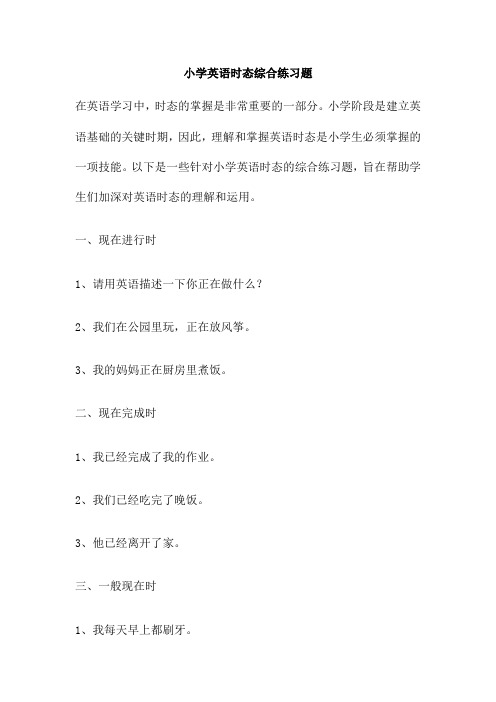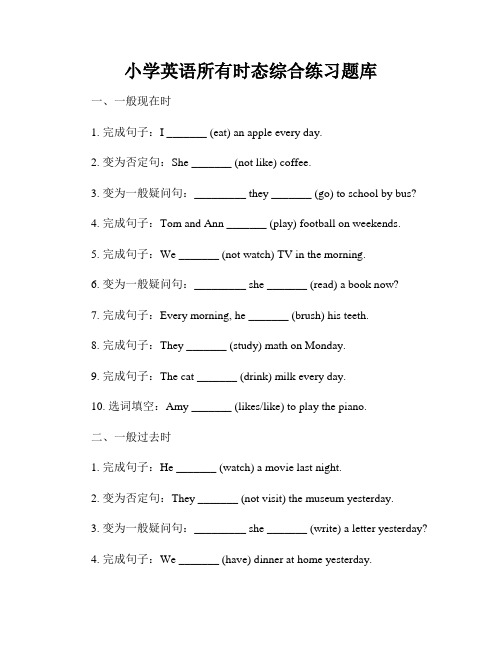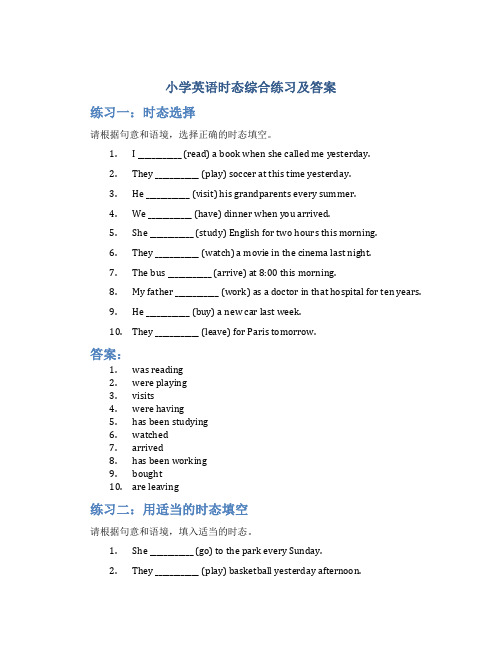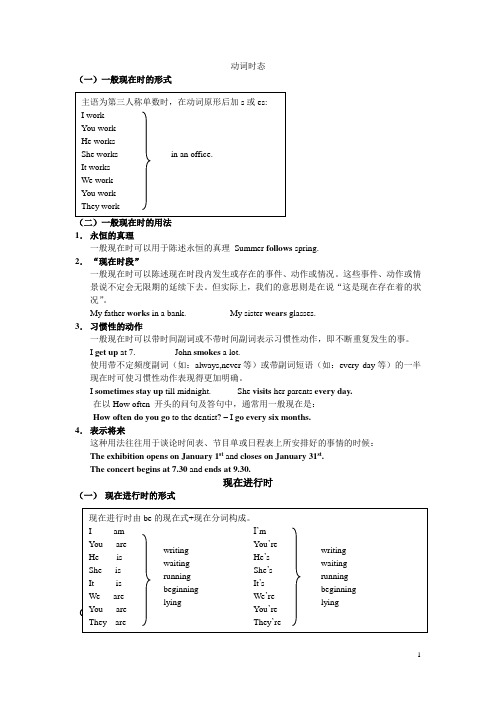时态综合
小学英语时态综合练习题

小学英语时态综合练习题在英语学习中,时态的掌握是非常重要的一部分。
小学阶段是建立英语基础的关键时期,因此,理解和掌握英语时态是小学生必须掌握的一项技能。
以下是一些针对小学英语时态的综合练习题,旨在帮助学生们加深对英语时态的理解和运用。
一、现在进行时1、请用英语描述一下你正在做什么?2、我们在公园里玩,正在放风筝。
3、我的妈妈正在厨房里煮饭。
二、现在完成时1、我已经完成了我的作业。
2、我们已经吃完了晚饭。
3、他已经离开了家。
三、一般现在时1、我每天早上都刷牙。
2、我们每周都去公园玩。
3、他每天晚上都读书。
四、一般过去时1、昨天我去了电影院。
2、上周我们去了海滩。
3、昨晚她看了电视。
五、一般将来时1、我明天将要完成作业。
2、我们下周将要去看电影。
3、他将在下个月搬到新家。
以上练习题旨在帮助学生理解和掌握基本的英语时态。
对于小学生来说,时态的学习可能相对复杂,但通过反复练习和实际应用,他们可以逐渐掌握并开始在日常生活中运用这些时态。
教师和家长可以鼓励学生多做类似的练习,帮助他们提高英语时态的理解和运用能力。
小学英语时态练习题一、一般现在时1、I eat apples every day. (我每天吃苹果。
)2、He studies hard every day. (他每天努力学习。
)3、They play basketball every week. (他们每周打篮球。
)二、现在进行时1、I am eating apples now. (我现在正在吃苹果。
)2、He is studying hard now. (他现在正在努力学习。
)3、They are playing basketball now. (他们现在正在打篮球。
)三、一般过去时1、I ate apples yesterday. (我昨天吃了苹果。
)2、He studied hard yesterday. (他昨天努力学习了。
)3、They played basketball yesterday. (他们昨天打篮球了。
小学英语所有时态综合练习题库

小学英语所有时态综合练习题库一、一般现在时1. 完成句子:I _______ (eat) an apple every day.2. 变为否定句:She _______ (not like) coffee.3. 变为一般疑问句:_________ they _______ (go) to school by bus?4. 完成句子:Tom and Ann _______ (play) football on weekends.5. 完成句子:We _______ (not watch) TV in the morning.6. 变为一般疑问句:_________ she _______ (read) a book now?7. 完成句子:Every morning, he _______ (brush) his teeth.8. 完成句子:They _______ (study) math on Monday.9. 完成句子:The cat _______ (drink) milk every day.10. 选词填空:Amy _______ (likes/like) to play the piano.二、一般过去时1. 完成句子:He _______ (watch) a movie last night.2. 变为否定句:They _______ (not visit) the museum yesterday.3. 变为一般疑问句:_________ she _______ (write) a letter yesterday?4. 完成句子:We _______ (have) dinner at home yesterday.5. 完成句子:He _______ (not play) basketball with his friends last weekend.6. 变为一般疑问句:_________ the dog _______ (bark) loudly just now?7. 完成句子:The students _______ (clean) the classroom after school.8. 完成句子:She _______ (visit) her grandparents last summer.9. 完成句子:They _______ (not go) to the park yesterday.10. 选词填空:We _______ (ate/eat) pizza for lunch yesterday.三、一般将来时1. 完成句子:She _______ (will visit) her friend tomorrow.2. 变为否定句:We _______ (will not play) soccer this weekend.3. 变为一般疑问句:_________ they _______ (have) a party next month?4. 完成句子:He _______ (will not go) to the movie theater tonight.5. 完成句子:Tom _______ (will study) for the exam tomorrow.6. 变为一般疑问句:_________ you _______ (travel) to Beijing next week?7. 完成句子:We _______ (will clean) the house this afternoon.8. 完成句子:She _______ (will not eat) dinner at home tonight.9. 完成句子:They _______ (will not buy) a new car in the future.10. 选词填空:He _______ (will/will not) be happy to see you.四、现在进行时1. 完成句子:They _______ (play) basketball in the park now.2. 变为否定句:She _______ (not watch) TV at the moment.3. 变为一般疑问句:_________ you _______ (do) your homework now?4. 完成句子:I _______ (eat) dinner with my family tonight.5. 完成句子:He _______ (not swim) in the pool currently.6. 变为一般疑问句:_________ they _______ (dance) in the hall right now?7. 完成句子:The students _______ (listen) to the teacher in the classroom.8. 完成句子:She _______ (read) a book by the window this morning.9. 完成句子:They _______ (not go) shopping at the moment.10. 选词填空:We _______ (is/are) playing soccer now.五、过去进行时1. 完成句子:She _______ (was dancing) at the party last night.2. 变为否定句:They _______ (were not cooking) dinner at that time.3. 变为一般疑问句:_________ you _______ (watch) TV when I called you?4. 完成句子:We _______ (were not studying) English in the library yesterday.5. 完成句子:He _______ (was not playing) the piano when I entered the room.6. 变为一般疑问句:_________ they _______ (singing) at the concert then?7. 完成句子:The students _______ (were reading) books in the classroom.8. 完成句子:She _______ (was not shopping) in the mall last weekend.9. 完成句子:They _______ (were not swimming) in the pool at that time.10. 选词填空:We _______ (were/was) having fun at the party yesterday.六、将来进行时1. 完成句子:They _______ (will be playing) soccer this time next week.2. 变为否定句:He _______ (will not be watching) a movie at that moment.3. 变为一般疑问句:_________ you _______ (be reading) a book at 9 o'clock tomorrow?4. 完成句子:We _______ (will not be traveling) to Paris this summer.5. 完成句子:She _______ (will not be cooking) dinner when I come home.6. 变为一般疑问句:_________ they _______ (be running) in the park at this time tomorrow?7. 完成句子:The students _______ (will be studying) for the exam in the library.8. 完成句子:He _______ (will not be working) late tonight.9. 完成句子:They _______ (will not be sleeping) when the sun rises tomorrow.10. 选词填空:We _______ (will be/will not be) having a meeting tomorrow morning.以上就是小学英语所有时态的综合练习题库。
小学英语时态综合练习及答案

小学英语时态综合练习及答案练习一:时态选择请根据句意和语境,选择正确的时态填空。
1.I ____________ (read) a book when she called me yesterday.2.They ____________ (play) soccer at this time yesterday.3.He ____________ (visit) his grandparents every summer.4.We ____________ (have) dinner when you arrived.5.She ____________ (study) English for two hours this morning.6.They ____________ (watch) a movie in the cinema last night.7.The bus ____________ (arrive) at 8:00 this morning.8.My father ____________ (work) as a doctor in that hospital for ten years.9.He ____________ (buy) a new car last week.10.They ____________ (leave) for Paris tomorrow.答案:1.was reading2.were playing3.visits4.were having5.has been studying6.watched7.arrived8.has been working9.bought10.are leaving练习二:用适当的时态填空请根据句意和语境,填入适当的时态。
1.She ____________ (go) to the park every Sunday.2.They ____________ (play) basketball yesterday afternoon.3.I ____________ (have) a cup of coffee this morning.4.He ____________ (visit) his grandparents last summer.5.We ____________ (watch) a movie in the cinema last night.6.The train ____________ (arrive) at 8:00 this morning.7.My father ____________ (work) as a teacher in that school for five years.8.They ____________ (buy) a new car last week.9.She ____________ (study) English for two hours yesterday.10.I ____________ (leave) for Paris tomorrow.答案:1.goes2.played3.had4.visited5.watched6.arrived7.has been working8.bought9.studied10.am leaving练习三:综合时态练习请根据句意和语境,填入适当的时态。
小学英语四大时态综合分析

一般现在时& 一般过去时现在进行时& 过去进行时一般现在时一般过去时一、形式:①主语+ be (am/is/are) ①主语+ be (was/were)②主语+ 动词原形②主语+ 动词原形二、用法:①经常性、习惯性的动作或存在的状态①在过去某时间发生的动作或存在的状态My father goes to work at 8 a.m. Every day. Tom broke the vase yesterday.②按预先计划、安排好将要发生的动作②在过去一段时间内经常发生的动作或状态The film starts at 10 a.m.. She got up at seven o’clock every day last year.三、时间标志:Always、often、usually、sometimes、yesterday、just now、last year、last month、seldom、never、every day an hour ago、five minutes ago、long long ago现在进行时过去进行时一、形式:主语+ be(am/is/are) + 现在分词主语+ be (was/were)+ 现在分词二、用法:①说话时刻正在发生或进行的动作①过去某一时刻正在发生或进行的动作He is showing me around his school. I was having breakfast at 7 o’clock yesterday.②现阶段正在进行的动作②过去某段时间或阶段内一直在进行的动作(常用的时间状语this week/month,these days) (说话时不一定在进行)They are preparing for the exam this week. They were traveling last month.③最近按计划或安排要进行的动作They were preparing for the exam last week. (常用的动词有come,go ,leave,start,arrive) ③与when连用,并表示当过去某动作发生I am leaving for Beijing this Sunday. 时,另一个动作正在进行。
六年级时态综合练习题

六年级时态综合练习题一、时态概念回顾时态是表示动作或状态发生的时间的一种语法形式。
在英语中,时态有多种形式,包括一般现在时、一般过去时、一般将来时等等。
在本练习题中,我们将通过一些练习来巩固和加深对时态的理解。
二、练习题1. 用适当的时态填空:a) I __________ (go) to the park yesterday.b) They __________ (play) basketball every Sunday.c) My father __________ (watch) TV right now.d) We __________ (visit) the zoo last week.e) She __________ (will eat) dinner at 7 pm tomorrow.2. 改错题:找出每句中的错误并进行修正。
a) He not go to school yesterday.b) I goed to the supermarket last night.c) They will went to the movie theater tomorrow.d) She doesn't likes chocolate.e) We have saw the movie before.3. 根据上下文,选择正确的动词形式填空。
a) Jane _________ (to go/goes) to the park every morning.b) They _________ (to exercise/exercises) for two hours yesterday.c) Tom _________ (to swim/swim) in the pool now.d) We _________ (to play/played) soccer last weekend.e) The cat _________ (to sleep/sleeps) on the couch at night.4. 根据句意,选择合适的时间状语填空。
四年级英语时态语态综合练习题30题

四年级英语时态语态综合练习题30题1. The students ______ in the classroom now.A. is studyingB. are studyingC. studyD. studies答案:B。
本题考查现在进行时。
now 是现在进行时的标志词,现在进行时的构成是“be + 动词的现在分词”,主语The students 是复数,所以be 动词用are,study 的现在分词是studying,A 选项is 用于主语是单数的情况,C 选项是一般现在时,D 选项studies 是第三人称单数形式,不符合句子的时态和主语,所以选B。
2. Mary often ______ her homework after school.A. doB. doesC. doingD. is doing答案:B。
本题考查一般现在时。
often 是一般现在时的标志词,主语Mary 是第三人称单数,所以动词要用第三人称单数形式,do 的第三人称单数形式是does,A 选项do 用于主语是非第三人称单数的情况,C 选项doing 是现在分词,D 选项is doing 是现在进行时,不符合句子的时态,所以选B。
3. Look! The boys ______ football on the playground.A. playB. are playingC. playsD. played答案:B。
本题考查现在进行时。
Look 是现在进行时的标志词,现在进行时的构成是“be + 动词的现在分词”,主语The boys 是复数,所以be 动词用are,play 的现在分词是playing,A 选项play 是动词原形,C 选项plays 是第三人称单数形式,D 选项played 是过去式,均不符合句子的时态,所以选B。
4. We ______ an English class every day.A. haveB. hasC. havingD. are having答案:A。
(完整版)高中英语时态综合练习,附答案

专业课原理概述部分一、选择题(每题1分,共5分)1.下列哪个时态表示过去某个特定时间发生的动作?A. Simple PresentB. Simple PastC. Simple FutureD. Present Continuous2.现在进行时态的构成是?A. 动词原形 + ingB. 动词过去式 + ingC. 动词原形D. will + 动词原形3.下列哪个句子使用了正确的过去进行时态?A. She was watched TV all evening.B. He was played football yesterday.C. They was eating dinner when I called.D. I was reading a book at 8 PM yesterday.4.将来完成时态的构成是?A. will have + 过去分词B. will + 动词原形C. would have + 过去分词D. is going to + 动词原形5.下列哪个时态表示将来某个时间开始,并可能继续下去的动作?A. Simple FutureB. Future ContinuousC. Future PerfectD. Present Continuous二、判断题(每题1分,共5分)1.现在进行时态不能用于描述正在进行的动作。
()2.过去进行时态的构成是was/were + 动词原形。
()3.将来完成时态可以用来表示在将来某个时间之前已经完成的动作。
()4.现在完成时态的构成是have/has + 过去分词。
()5.过去完成时态的构成是had + 过去分词。
()三、填空题(每题1分,共5分)1.我昨天晚上_____(read)了一本好书。
2.他们_____(go)去公园散步了。
3.当她到达学校时,雨_____(stop)了。
4.到明年这个时候,我_____(graduate)已经三年了。
四大时态综合

stand—stood, bring—brought,
buy— bought, catch—caught, will—would
think—thought,fight-fought, teach—taught can—could, come—came, become—became
hear —heard〔hɜ:d〕, mean—meant〔ment〕,
ring—rang, sing—sang, sit—sat,
swim—swam drive—drove, ride—rode,
write—wrote draw—drew, grow—grew,
know—knew, throw—threw, fly-flew,
blow-blew
get—got, forget—forgot
肯定句:主语+will+动词原形+其它成份 I will write to him next week.
否定句:主语 + will + not + 动词原形 +其它成份 They won't watch TV this evening.
一般疑问句:will+主语+动词原形+其它成份 Will you stay at home with us tomorrow?
say—said〔sed〕, spend-spent,
build-built
say-said,
pay-paid
let—let, hit-hit,
put—put, hurt-hurt,
read—read /red/, cut-cut,
shut-shut
find-found, lose-lost,
英语语法大攻克--时态综合复习

动词时态(一)一般现在时的形式(二)一般现在时的用法1. 永恒的真理一般现在时可以用于陈述永恒的真理 Summer follows spring.2. “现在时段”一般现在时可以陈述现在时段内发生或存在的事件、动作或情况。
这些事件、动作或情景说不定会无限期的延续下去。
但实际上,我们的意思则是在说“这是现在存在着的状况”。
My father works in a bank. My sister wears glasses.3. 习惯性的动作一般现在时可以带时间副词或不带时间副词表示习惯性动作,即不断重复发生的事。
I get up at 7. John smokes a lot.使用带不定频度副词(如:always,never 等)或带副词短语(如:every day 等)的一半现在时可使习惯性动作表现得更加明确。
I sometimes stay up till midnight. She visits her parents every day.在以How often 开头的问句及答句中,通常用一般现在是:How often do you go to the dentist? – Igo every six months.4. 表示将来这种用法往往用于谈论时间表、节目单或日程表上所安排好的事情的时候:The exhibition opens on January 1st and closes on January 31st .The concert begins at 7.30 and ends at 9.30.现在进行时(一) 现在进行时的形式现在进行时表示说话时正在进行的动作或事件。
往往与now, at the moment, just等副词连用,以示强调:Someone‟s knocking at the door. Can you answer it ?有人敲门,你去开一下好吗?What are you doing ? —I‘m just tying up my shoe-laces.你在干什么?——我在系鞋带。
综合时态(一般现在时、现在进行时、一般将来时、一般过去时)

综合时态一般现在时一般过去时现在进行时 概念时间标志词结构经常性、习惯性的动作频率副词:always/ usually/often/sometimese very day/week/month/yearb e 动词实义动词a m \is \are否定句:be 后加not一般疑问句:be 动词提前动词原形(非第三人称单数)三单(第三人称单数)一般疑问句:Do they like pandas?一般疑问句:Does she like pandas?概念时间标志词结构已经发生过的动作或事情y esterday \ last week 、last month 、last year实义动词概念正在发生的事或动作时间标志词n ow\ look \listen结构b e+动词ing一般将来时概念还没有发生的事情或动作时间标志词t omorrow \ next day 、next week 、next year……结构w ill +动词原形b e going to +动词原形 w as \ were一般疑问句:Was she ten years old last year?肯定句: She was ten years old last year.否定句: She was not ten years old last year.b e 后加notb e 动词提前句式肯定句:She went shopping yesterday.否定句:She didn't go shopping yesterday.动词前加didn't,一般疑问句:Did she go shopping yesterday?句前加Did注意:didn't 和did 后动词要还原成原形动词变化规则一般情况直接加ed以不发音的e 结尾加d like——liked以辅音字母加y 结尾,变y 为i 加ed study——studied以辅元辅结尾的重读闭音节结尾,双写尾字母加ed stop——stopped肯定句:They like pandas.否定句:They don't like pandas.借助don't句前加Do肯定句:She likes pandas.否定句:She doesn't like pandas.动词前加doesn't句前加Does动词ing 变化规则句式肯定句: She is reading否定句:She is not readingb e 后加notb e 后加not一般疑问句:Is she reading?b e 动词提前直接加ing不发音的e 结尾,去e 加ing以重读闭音节结尾的单词,双写尾字母加ing shop——shopping以ie 结尾,变ie 为y 加ing lie——lying肯定句: He will visit his grandmother.否定句: He will not visit his grandmother.一般疑问句: Will he visit his grandmother ?肯定句: He is going to visit his grandmother.否定句: He isn't going to visit his grandmoter.一般疑问句:Is he going to visit his grandmother? 否定句:will 或be 后加not一般疑问句 will 或be 动词提前。
8个时态综合练习题

8 个时态综合练习题
时态的基本判定方式如下: 1.如果句子中出现了表示过去的时间状语,如 yesterday、 last year、two days ago 等,那么谓语动词要使用一般过去时。 2.如果句子中出现了表示将来的时间状语,如 tomorrow、 next week、in two hours 等,那么谓语动词要使用一般将来时。 3.如果句子中既有过去时间状语,又有具体时间点,如 at 5:00、this time、at that time 等,那么谓语动词要使用过去进行 时。 4.如果句子中出现了表示过去一段时间的时间状语,如 recently、in the last/past two years、over the years 等,那么谓语 动词要使用现在完成时。 5.如果句子中出现了表示过去完成的时间状语,如 by (the end of) last year、two days before、by the time +从句等,那么 谓语动词要使用过去完成时。 6.如果句子中没有以上时间状语,但是出现了表示现在时 间关系的词语,如 now、today、XXX 等,那么一般使用一般 现在时。 1.What did you do over the weekend?
2.Xiao Li rode her bike to school last year. 3.What will happen in our town 100 years from now? 4.Mr。Smith will come to see you in an hour. 5.Have you heard from your parents recently? 6.We were watching TV at home this time last night. 7.By the end of last month。we had learned over 1500 English words.
小学英语时态综合练习附答案

动词原形:表示经常性、习惯性的动作或状态
第三人称单数形式:动词词尾加-s或-es,如“he runs” 否定形式:在动词前加助动词“do not”或缩写“don't”,如“I don't like it” 疑问句形式:将助动词“do”放在句首,如“Do you like it?”
写出下列动词的第三人称单数形式:go _______,do _______,have _______。 用括号内动词的正确形式填空:I _______ (live) in Beijing. 选择正确的动词时态填空:I _______ (watch) TV every day. 翻译下列句子:他每天早上六点起床。He _______ at 6 o'clock every morning.
添加 标题
用所给动词的正确形式填空:I ______ (listen) to music while my brother ______ (watch) TV.
添加 标题
选择正确的动词时态填空:I ______ (not finish) my homework yet.
添加 标题
将下列句子变成否定句和疑问句:She is singing in the next room.
添加 标题
将下列句子变成一般疑问句并作肯定回答:They are having a meeting at the moment.
现在进行时的定 义:表示正在进 行的动作或状态
现在进行时的结 构:be动词+动 词ing
现在进行时的标 志词:now, at the moment, 等
现在进行时与一 般现在时的区别: 现在进行时强调 正在进行的动作, 一般现在时表示 经常发生的动作 或状态
六大时态综合(一般现在时 一般过去时 一般将来时 现在进行时 过去进行时 现在完成时)

六大时态综合一般现在时●定义●表示经常性或习惯性的动作●表示事物或人物的特征或状态●表示客观真理、科学事实或名言警句●结构●主语+am/is/are+其他●主语+情态动词(can/may/need...)+动词原形●主语+行为动词+其他●非三单主语(不是第三人称单数主语)+动词原形+其他●三单主语(第三人称单数主语)+动词三单形式(动词第三人称单数形式)+其他●第三人称单数主语主要有:他她它(he/she/it)、可数名词单数、不可数名词、复合不定代词(something/nothing/everything/someone/somebody/nobody...)、动名词短语作主语...●动词三单形式(动词第三人称单数形式)●一般情况下直接加s,如:play→plays●以sh/ch/x/s/o结尾→加es,如:go→goes●辅音加y结尾,去y为i再加es,如:study→studies●特殊:have的三单形式是has●时态标志词●表示频率或次数:usually/often/always/sometimes/never/hardly/seldom/once a week/twicea week/three times a week●其他:every day/week/month/season/year,on the weekend,on+星期等●句型转换●肯定句●主语+am/is/are+其他.●I am a student.●主语+情态动词(can...)+动词原形+其他●He can swim.●主语+行为动词+其他●非三单主语+动词原形+其他●They often play football.●三单主语+动词三单形式+其他●He often plays football.●否定句●主语+am/is/are+not+其他.●I am not a student.●主语+情态动词(can...)+not+动词原形+其他●He can not swim.●主语+助动词(do/does)+not+动词原形+其他●非三单主语+don't+动词原形+其他●They don't often play football.●三单主语+doesn't+动词原形+其他●He doesn't often play football.●一般疑问句●Am/Is/Are +主语+其他?●肯定回答:Yes,主语+am/is/are.●否定回答:No,主语+am not/isn't/aren't.●Are you a student?●Yes,I am.●No,I am not.●情态动词(Can...)+主语+动词原形+其他?●肯定回答:Yes,主语+can.●否定回答:No,主语+can't.●Can he swim?●Yes,he can.●No,he can't.●助动词(do/does)+主语+动词原形+其他?●Do+非三单主语+动词原形+其他?●肯定回答:Yes,主语+do.●否定回答:No,主语+don't.●Do they often play football?●Yes,they do.●No,they don't.●Does +三单主语+动词原形+其他?●肯定回答:Yes,主语+does.●否定回答:No,主语+doesn't.●Does he often play football?●Yes,he does.●No,he doesn't.●特殊疑问句●特殊疑问词+am/is/are+主语?●How are you?●特殊疑问词+情态动词(can...)+主语+动词原形+其他?●What can they do?●特殊疑问词+助动词(do/does)+主语+动词原形+其他?●特殊疑问词+do+非三单主语+动词原形+其他?●What do they often do?●特殊疑问词+does+三单主语+动词原形+其他?●What does he often do?●特殊用法●一般现在时表示客观事实或普遍真理(真理永一现)●The sun rises in the east.(太阳从东边升起)●一般现在时可以表示将来时间上已确定或安排好要发生的事情(一般现在时表将来,常见词有瞬间动词:come/go/arrive/leave/start/begin等)●The train leaves at 7:00 a.m. tomorrow.(火车明天早上7点开)●在主从复合句(时间状语从句、条件状语从句)中,时态:主将从现(主句用一般将来时,从句用一般现在时)●If it doesn't rain tomorrow,we will play football outside. (如果明天不下雨,我们就会在户外踢足球)一般将来时●定义●表示将要发生的动作或存在的状态●结构●主语+will/shall+动词原形+其他●注意:主语是I或we时,常用shall●主语+be动词(am/is/are) going to+动词原形+其他●时态标志词●tomorrow, the day after tomorrow, in the future, tonight, soon, from now on●in+未来年份, in+一段时间(在...之后), next+年/季节/月/日...●句型转换●肯定句●主语+will/shall+动词原形+其他●I will go shopping tomorrow.●主语+be动词(am/is/are) going to+动词原形+其他●I am going to watch a movie with Tom tomorrow.●否定句●主语+will+not+动词原形+其他●I won't go shopping tomorrow.●主语+be动词(am/is/are)+not+going to+动词原形+其他●I am not going to watch a movie with Tom tomorrow.●一般疑问句●Will+主语+动词原形+其他?●肯定回答:Yes,主语+will●否定回答:No,主语+won't●Will you go shopping with Tom?●Yes,I will.●No,I won't.●Be动词(am/is/are)+主语+going to+动词原形+其他?●肯定回答:Yes,主语+be动词(am/is/are).●否定回答:No,主语+be动词(am/is/are)+not.●Are you going to go shopping with Tom?●Yes,I am.●No,I am not.●特殊疑问句●特殊疑问词+will+主语+动词原形+其他?●When will you go shopping with Tom?●特殊疑问词+be动词(am/is/are)+主语+going to+动词原形+其他?●When are you going to go shopping with Tom?●特殊用法●There be 句型的一般将来时●There will be+其他●There will be a football match tomorrow.●There is/are going to be +其他●There is going to be a football match tomorrow.●可用于表将来的其他结构●一般现在时可以表示将来时间上已确定或安排好要发生的事情(一般现在时表将来,常见词有瞬间动词:come/go/arrive/leave/start/begin等)●The train leaves at 7:00 a.m. tomorrow.●Here comes the bus.(倒装句)●在主从复合句(时间状语从句、条件状语从句)中,时态:主将从现(主句用一般将来时,从句用一般现在时)●If it doesn't rain tomorrow,we will play football outside.●现在进行时可以表示将要发生的动作(现在进行时表将来的意思,常见词有位移动词:come/go/arrive/leave/start/begin等)●He is leaving Guangzhou for Beijing tomorrow.●“be to+动词原形”表将来●Tom is to be married next week.●“be about to+动词原形”表将来●The bus is about to leave.●will do与be going to do 区别●时间长短●will do侧重离现在较远的未来会发生的事情,时间相对较远●be going to侧重即将要发生或近期计划发生的事情,时间相对较近●主观与客观●will do侧重客观,新闻媒体/气象预报等官方消息,用will do●be going to do侧重个人意图,强调说话人主观上计划或安排或推测某事●其他注意点●表计划/打算/推测(有明显迹象),用be going to do●没有事先计划或考虑的临时起意,用will do一般过去时●定义●表示过去经常性或习惯性的动作●表示过去某一具体时间发生的动作或存在的状态●结构●主语+was/were+其他●主语+情态动词(could/might...)+动词原形●主语+行为动词过去式+其他●行为动词过去式●行为动词过去式规则变化●一般情况下直接加ed,如:play→played●以不发音的e结尾→加d,如:like→liked●以辅音字母加y结尾,去y为i再加ed,如:study→studied●以重读闭音节(辅元辅)结尾,双写末字母再加ed,如:plan→planned●行为动词过去式不规则变化●详情请见微信公众号焦糖英语推文附录●时态标志词●yesterday, the day before yesterday, last night/week/month/year, just now, at that time●used to, the other day, 时间+ago, in+过去年份...●句型转换●肯定句●主语+was/were+其他.●I was a student.●主语+情态动词(could/might...)+动词原形+其他●He could swim.●主语+行为动词过去式+其他●He went swimming yesterday.●He played games yesterday.●否定句●主语+was/were+not+其他.●I was not a student.●主语+情态动词(could/might...)+not+动词原形+其他●He could not swim.●主语+助动词(did)+not+动词原形+其他●They didn't play football.●一般疑问句●Was/Were +主语+其他?●肯定回答:Yes,主语+was/were.●否定回答:No,主语+wasn't/weren't.●Were you a student?●Yes,I was.●No,I wasn't.●情态动词(Could/Might...)+主语+动词原形+其他?●肯定回答:Yes,主语+could.●否定回答:No,主语+couldn't.●Could he swim when he was young?●Yes,he could.●No,he couldn't.●助动词(Did)+主语+动词原形+其他?●肯定回答:Yes,主语+did.●否定回答:No,主语+didn't.●Did they often play football when they was young?●Yes,they did.●No,they didn't.●特殊疑问句●特殊疑问词+was/were+主语?●What was your job last year?●特殊疑问词+情态动词(could...)+主语+动词原形+其他?●What could they do when they was young?●特殊疑问词+助动词(did)+主语+动词原形+其他?●What did he do yesterday?现在进行时●定义●表示现在此时此刻、现阶段正在进行或发生的动作、存在的状态●结构●主语+am/is/are+动词ing形式●动词ing形式●直接加ing,如:play→playing●以不发音的e结尾,去e再加ing,如:take→taking●以重读闭音节(辅音字母+元音字母+辅音字母)结尾,双写末尾字母再加ing,如:plan→planning●以ie结尾,去ie为y再加ing,如:die→dying●时态标志词●look,now,listen,right now,具体时刻,Where is...●句型转换●肯定句:主语+am/is/are+动词ing+其他.●We are watching TV now.●否定句:主语+am/is/are+not+动词ing+其他.●We are not watching TV now.●一般疑问句:Am/Is/Are +主语+动词ing+其他?●肯定回答:Yes,主语+am/is/are.●否定回答:No,主语+am not/isn't/aren't.●Are you watching TV now?●Yes,we are.●No,we aren't.●特殊疑问句:特殊疑问词+am/is/are+主语+动词ing+其他?●What are you doing now?●特殊用法●现在进行时可以表示不断发生变化的事情●The weather is getting warmer and warmer.(天气变得越来越暖和)●现在进行时可以用来表示反复出现或习惯性的动作,隐含说话人表扬/喜好或不满/厌恶的情绪,常与always/continually/constantly/forever等词搭配使用●She is always coming late. (隐含不满的情绪)●现在进行时可以表示将要发生的动作(现在进行时表将来的意思,常见词有位移动词:come/go/arrive/leave/start/begin等)●He is leaving Guangzhou for Beijing tomorrow. (他明天要离开广州去北京)过去进行时●定义●过去过去某一时刻正在进行的动作,或表示过去某一阶段一直在进行的动作。
初中四种时态综合复习

初中四种时态综合复习在初中英语中,有四种主要的时态,它们分别是:一般现在时、一般过去时、一般将来时和现在进行时。
这些时态在表达不同时间和动作的时候起着重要的作用。
一般现在时 (Simple Present Tense)一般现在时用于表达常规性的动作、惯、事实、真理等。
在构成上,我们使用动词的原形。
例如:- I play football every Saturday.- She always brushes her teeth before bed.一般过去时 (Simple Past Tense)一般过去时用于表达过去发生的事情或状态。
在构成上,我们在动词后面加上 -ed(例如规则动词)或使用不规则动词的过去式形式。
例如:- They visited their grandparents last weekend.- He ran in the race and won first place.一般将来时 (Simple Future Tense)一般将来时用于表示将来要发生的动作或状态。
在构成上,我们使用 "will" 加上动词的原形。
例如:- We will go shopping tomorrow.- She will study hard for the exam.现在进行时 (Present Continuous Tense)现在进行时用于表达正在进行的动作。
在构成上,我们使用"am/is/are" 加上动词的现在分词形式。
例如:- I am currently studying for my exams.- They are playing basketball in the park.总结初中英语的四种主要时态是:一般现在时、一般过去时、一般将来时和现在进行时。
我们可以根据具体的情况选择正确的时态来表达不同的动作和时间。
熟练掌握这些时态可以帮助我们更好地理解和表达英语中的各种情况。
时态综合练习题

时态综合练习题1. 过去式过去式是用来表示已经发生过的动作、事情或状态的时态。
在英语中,过去式通常由动词的过去式形式(例如,加了-ed后缀的动词)表示。
例如:- I studied for the exam last night.(昨晚我学习了考试的内容。
)- She cooked dinner for her family yesterday.(她昨天为家人做了晚饭。
)- They went to the beach during their vacation.(他们在假期期间去了海滩。
)2. 现在完成时现在完成时用来表示过去发生的动作或事情与现在的关系。
通常由助动词“have / has”和动词的过去分词形式构成。
例如:- I have seen that movie before.(我以前看过那部电影。
)- She has already finished her homework.(她已经完成了她的作业。
)- They have lived in this city for five years.(他们在这个城市居住了五年了。
)3. 过去完成时过去完成时用来表示在过去某个时间或动作之前已经发生或完成的动作或事情。
通常由助动词“had”和动词的过去分词形式构成。
例如:- I had already eaten when she arrived.(她到达时我已经吃过饭了。
)- They had finished the project before the deadline.(他们在截止日期之前完成了这个项目。
)- She had studied German for two years before moving to Germany.(在搬到德国之前,她已经学了两年德语。
)4. 现在进行时现在进行时用来表示现在正在进行或发生的动作或事情。
通常由助动词“am / is / are”和动词的现在分词形式构成。
初中六大时态时态综合复习

初中六大时态目标一:时态区分 目标二:时态互换 目标三:综合训练【目标一:时态区分】 ➢ 中文时态考题经过一个月的努力,我们的法语水平有 很大的提高。
A .过 B.了 C.着 D.的 ➢ 汉译英➢英文主要用谓语动词来表示时间上的变化。
他昨天走了。
他今天走了。
他明天走。
中文是怎么表示时间上的变化? 英文是怎么表示时间上的变化?➢ 英语时态,首先要正确掌握各种时态的形式构成,以work 为例,在对应时态的方框里填入谓语结构。
➢ 然后着重掌握不同时态形式背后的意义表达。
➢各时态用法练一练:单项选择1.Don’t turn on the TV. Grandma ________ now.A. is sleepingB. will sleepC. sleptD. sleeps2.We were in Beijing last week and ________ great fun there.A. will haveB. have hadC. hadD. have3.Hello! Can I speak to Alice? ------ Sorry. She isn’t here right now. She ________ to the shop.A. goesB. will goC. has goneD. was going4.Look! Jane’s grandmother ________ with some aged(老年的)people in the park.A. dancesB. dancedC. is dancingD. was dancing5.Tom ________ to work in his hometown after he graduated(毕业) from university.A. goesB. wentC. will goD. had gone6.________ you ________ the film Harry Potter 5? ------Not yet. I’ll see it this Sunday.A. Did, seeB. Are, seeingC. Have, seenD. Do, see7.The children ________ a P.E. class on the playground(操场)when it suddenly began to rain.A. haveB. are havingC. hadD. were having8.Jim ________ a new camera. He has taken lots of pictures with it.A. buysB. is buyingC. boughtD. will buy9.Please bring your homework to school tomorrow, Steven. ------OK. I ________.A. willB. won’tC. doD. don’t10.How’s Annie? I ________ her for a long time.A. don’t seeB. won’t seeC. didn’t seeD. haven’t seen11.Look! The light is still on in Mr. Zhang’s office. ------I’m afraid he ________ his work yet.A. doesn’t finishB. didn’t finishC. hasn’t finishedD. won’t finish12.What did the teacher say just now? ------Sorry. I didn’t catch it. I ________ something else.A. thinkB. will thinkC. was thinkingD. had thought13.Happiness(幸福)________ in her grandfather’s eyes every time he hears her voice.A. shinesB. is shiningC. has shoneD. was shone14.She ________ the same song so many times. I’m getting sick of it!A. singsB. sangC. will singD. has sung15.Did you see a girl in white pass by just now? ------No, sir. I ________ a newspaper.A. readB. was readingC. would readD. am reading【目标二:时态互换】英语中的几种时态在一定情况下可以互相转换,以下是几种常见的转换形式:➢一般过去时与现在完成时的转换在现在完成时中,延续性动词能与表示一段时间的状语连用,瞬间动词却不能。
时态综合练习题答案

时态综合练习题答案时态是英语中一个非常重要的语法概念,它用于表达动作发生的时间。
正确的时态使用可以让我们的语言更加准确和流畅。
下面是一些综合练习题的答案,帮助你更好地理解和掌握不同时态的用法。
一、选择正确的时态填空:1. He _______ (work) at this company for five years before he got promoted.答案:had worked2. By the time I arrived, the party _______ (already/start).答案:had already started3. She _______ (not visit) her grandparents since she moved to the city.答案:has not visited4. They _______ (be) to Japan twice.答案:have been5. I _______ (read) that book several times when I was a child.答案:read6. When the police arrived, the thief _______ (run) away.答案:had already run7. I _______ (live) in this city for ten years.答案:have lived8. She _______ (not finish) her homework yet.答案:has not finished9. We _______ (study) English for three years before we moved to England.答案:had studied10. I _______ (visit) my grandparents last weekend.答案:visited二、改错题:1. Don't call him now. He studies for his exams at the moment.答案:studies → is studying2. They don't been to Australia before, but they have been to New Zealand.答案:don't been → haven't been3. By the time she arrived, the movie already started.答案:started → had already started4. We have lived here since we were five years old.答案:were → have been5. I'm so tired because I worked all day long.答案:worked → have worked6. I go to the gym every day, but I haven't been there this week.答案:go → have gone7. She has already ate lunch, so she's not hungry anymore.答案:ate → eaten8. He has never traveled by plane, but he has traveled by train.答案:has tr aveled → has been9. I saw her a few minutes ago. She just leaves the office.答案:leaves → left10. They will come to the party if they finish their work in time.答案:finish → finish三、根据上下文填入合适的时态:1. I _______ (see) that movie before, but I want to see it again.答案:have seen2. He _______ (watch) TV when the phone rang.答案:was watching3. By the time I got home, my parents _______ (already/go) to bed.答案:had already gone4. I _______ (read) the book you recommended. It was amazing!答案:have read5. When I arrived at the station, the train _______ (already/leave).答案:had already left6. She _______ (live) in this city for two years.答案:has lived7. He _______ (work) at his current job since last year.答案:has worked8. I _______ (visit) my grandparents every summer when I was a child.答案:used to visit9. By the time she finishes work, it _______ (already/get) dark.答案:will have already gotten10. We _______ (wait) for the bus for 30 minutes before it finally arrived.答案:had been waiting通过以上练习题的答案,相信你对时态的使用有了更深入的了解。
大学四种时态综合复习

大学四种时态综合复习现在时态- 现在时态用来描述目前正在发生的动作或状态。
- 表达方法:主语 + 动词的原形(第三人称单数要加-s)+ 其他。
- 例句:- 我现在研究中文。
(I am studying Chinese now.)- 他们每天上学。
(They go to school every day.)过去时态- 过去时态用来描述已经发生的动作或状态。
- 表达方法:主语 + 动词的过去式 + 其他。
- 例句:- 我昨天去了电影院。
(I went to the cinema yesterday.)- 她小时候住在乡村。
(She lived in the countryside when she was young.)将来时态- 将来时态用来描述将要发生的动作或状态。
- 表达方法:主语 + will + 动词的原形 + 其他。
- 例句:- 我明天会给你打电话。
(I will call you tomorrow.)- 他们下个月要去旅行。
(They will go on a trip next month.)完成时态- 完成时态用来描述过去某个时间点之前已经完成的动作或状态。
- 表达方法:主语 + have/has + 动词的过去分词 + 其他。
- 例句:- 我已经完成作业了。
(I have finished my homework.)- 他们已经看过这部电影了。
(They have watched this movie.) 以上是大学四种时态的综合复习内容,希望能对你有帮助!。
- 1、下载文档前请自行甄别文档内容的完整性,平台不提供额外的编辑、内容补充、找答案等附加服务。
- 2、"仅部分预览"的文档,不可在线预览部分如存在完整性等问题,可反馈申请退款(可完整预览的文档不适用该条件!)。
- 3、如文档侵犯您的权益,请联系客服反馈,我们会尽快为您处理(人工客服工作时间:9:00-18:30)。
时态综合【key points】时态综合——用法一般现在时:现在的状态和经常反复的动作一般过去时:过去的状态和动作现在进行时:现在正在进行的动作时态综合——构成一般现在时:主语+ be (am/is/are) + 其他主语+ 实义动词(原形/单三) + 其他一般过去时:主语+ be(was/were) + 其他主语+ 实义动词过去式+ 其他现在进行时:主语+ be + 动词-ing + 其他时态综合——标志词一般现在时:in the morning / on Sundays / every day / usually, often, always…一般过去时:yesterday / last week / two hours ago / just now现在进行时:now, right now, at the moment / look, listen / these days小试牛刀【exercise】用括号中动词的适当形式填空。
1. He ______ (get) up at six o’clock every day.2. Look! The dog _____________ (run) after a cat.3. We _______ (swim) yesterday afternoon.4. —Where is Tom?—He __________ (lie) on the beach.5. Lucy cleaned the room and _______ (take) a walk.6. He always ______ (stay) at home last summer vacation.时态综合——句式变换一般现在时:①I am in Zhengzhou.否定I’m not in Zhengzhou.一般疑问Are you in Zhengzhou?特殊疑问Where are you?②Tom loves cats.否定Tom doesn’t love cats.一般疑问Does Tom love cats?特殊疑问What does Tom love?一般过去时:①I was in Zhengzhou.否定I wasn’t in Zhengzhou.一般疑问Were you in Zhengzhou? 特殊疑问Where were you?②Tom loved cats.否定Tom did n’t love cats.一般疑问Did Tom love cats?特殊疑问What did Tom love?现在进行时:Tina is looking for her dog.否定Tina isn’t looking for her dog.一般疑问Is Tina looking for her dog? 特殊疑问What is Tina looking for?【小试牛刀】1. Lily is 8 years old.否定:一般疑问:特殊疑问:2. Mr. Li likes playing the piano.否定:一般疑问:特殊疑问:3. He wrote a letter yesterday.否定:一般疑问:特殊疑问:时态常考难点1. usually, often, always …频率副词可用于一般现在时、一般过去时;always还可用于现在进行时表强烈感情色彩2. 客观真理和自然现象等不受其他时态影响,要用一般现在时。
【综合训练】一、填空1. We ______ (be) students two years ago.2. _____ you ______ (brush) your teeth every morning?3. You can’t leave now. It __________ (rain) outside.4. —What ______ Jeff ______ (do) last night?—He__________ (watch) TV.5. He _______________ (not watch) TV now.6. My sister ______________ (not exercise) at noon and my brother __________ (not do) his homework at night.7. David usually _______ (have) dinner at six. It’s seven o’clock now.He___________(have) his dinner.8. —When _____ Allan usually _____ (do) some reading?—He usually _____ (do) it in the evening, but yesterday he _____ (do) some reading in the morning.二、单选1. Please keep quiet! These babies _____ now.A. sleepsB. are sleepingC. sleepD. slept2. —Have you read the news?—Yes. I _____ it a month ago.A. am readingB. have readC. will readD. read3. —Where _____ you _____ lunch?—At home. There was no school lunch.A. did; haveB. are; havingC. will; haveD. do; have4. Lucy _____ a student last year, but now she _____ a teacher.A. is; isB. was; isC. was; will beD. is; was5. My sister _____ early on Sundays.A. don’t get upB. don’t gets upC. doesn’t get upD. doesn’t gets up6. He usually _____ to school on his father’s car when he was young.A. goesB. goC. wentD. going7. He said that light _____ much faster than sound.A. has travelledB. wentC. travelsD. travelled8. There _____ som e flowers on the teacher’s desk just now, but now there _____ nothing on it.A. have; hasB. were; wasC. were; isD. has; has9. The teacher told the students that five and five ____ ten.A. isB. areC. wasD. were10. —Could you tell me _____? He is wanted by the head teacher.—Sorry, I’ve no idea. But he _____ here just now.A. where Tim was; wasB. where is Tim; wasC. where Tim is; wasD. where Tim is; is讲义参考答案时态综合—用法,构成,标志词【小试牛刀】用括号中动词的适当形式填空。
1.gets2.is running3.swam4.is lying5.took6. stayed时态综合—句式变换【小试牛刀】1. Lily is 8 years old.否定:Lily isn’t 8 years old.一般疑问:Is Lily 8 years old?特殊疑问:How old is Lily?2. Mr. Li likes playing the piano.否定:Mr. Li doesn’t like playing the piano.一般疑问:Does Mr. Li like playing the piano?特殊疑问:What does Mr. Li like?3. He wrote a letter yesterday.否定:He didn’t write a letter yesterday.一般疑问:Did he write a letter yesterday?特殊疑问:What did he do yesterday?【综合训练】一、填空1.were2.Do; brush3.is raining4.did;do;watched5.isn’t watching6.doesn’t exercise; doesn’t do7.has; is having 8. does; do; does; did二、选择题1—5:BDABC6—10:CCCAC。
